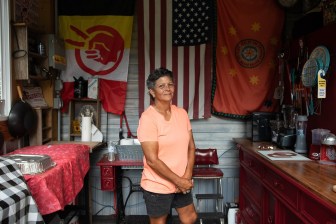Oklahoma’s House Bill 1775 doesn’t ban any specific books, but one effect of the law has been teachers self-censoring the books students can access. The fear: one complaint could put their career and their district’s accreditation at risk.
Last week, a Norman high school English teacher resigned over a district policy related to House Bill 1775. Summer Boismier was removed from her classroom the first week of school after posting a code that, when read by a smartphone camera, directs students to the Brooklyn Public Library’s Books Unbanned program.
On Wednesday, Oklahoma Secretary of Education and candidate for state superintendent Ryan Walters called for the state to revoke her teaching certificate —a consequence normally reserved for very serious allegations of child abuse, predatory behavior or other alleged crimes. The mother who complained told FOX25 she was concerned about students accessing “pornographic books,” in particular, “Gender Queer: A Memoir” by Maia Kobabe.
The book is one of many available through the Books Unbanned program, created in response to efforts nationwide to remove books from library shelves. The library is “fighting for the rights of teens nationwide to read what they like, discover themselves, and form their own opinions,” according to a statement on their webpage.
“Gender Queer: A Memoir” was the most challenged book of 2021 according to the American Library Association. It’s an illustrated graphic novel about the author’s path to identifying as nonbinary, which is not identifying as either a man or a woman.
Parents and GOP lawmakers in some communities have objected to the book based on the inclusion of some explicit images, including depictions of masturbation and some sexual experiences. A recent attempt to label the book as obscene in Virginia failed.
A judge threw out a lawsuit filed by a Virginia Beach tattoo shop owner and former Republican congressional candidate, who wanted “Gender Queer: A Memoir” and the fantasy romance novel “A Court of Mist and Fury” deemed illegal to sell or lend in the state, according to an Associated Press story. He argued the description or illustration of sexual acts in the books were inappropriate for children.
The judge ruled the book didn’t meet the standard of obscenity and said restricting the distribution of the books would violate the First Amendment.
“The First Amendment protects literary expression, even when some people find portions of the works difficult or objectionable. All people should be able to choose what they wish to read,” said attorney Matt Callahan, with the ACLU of Virginia, which challenged the lawsuit on behalf of booksellers.
Students: We want to hear from you. What do you think about these book bans? Are you concerned, or not? I’d love to hear from you via email or DM.
— Jennifer Palmer
Correction: In last week’s newsletter, teacher Summer Boismier’s name was spelled incorrectly. Oklahoma Watch regrets the error.
Recommended Reading
- Q&A with the author of “Gender Queer: A Memoir,” the most challenged book of 2021. “I think it’s really dangerous and unfair to shield young people from things like sex and health and information about their bodies—partly because there is so much misinformation online,” Maia Kobabe said. [TIME Magazine]
- Pandemic aid for schools turned out to be a radical experiment in funding schools based on student needs. But the funds are dwindling and must be spent in two years. Where will that leave school budgets? [Chalkbeat]
- Secretary of Education Ryan Walters says he wants to reject federal dollars for education if it doesn’t live up to “Oklahoma values.” The funds make up about 10% of school budgets and include programs like free and reduced school meals. [FOX25]
Tweet Watch
New on Oklahoma Watch
Pandemic Relief Committee Approves $323 Million in Projects
Oklahoma lawmakers have approved $323 million in projects to deal with the fallout of the coronavirus pandemic to votes in the full House and Senate expected by late September. Read the story.
Whistleblowers Allege Embezzlement, Fraud at Tahlequah Nonprofit That Championed Indigenous Women
An Oklahoma Watch investigation shows how the lack of oversight resulted in years of mismanagement and allegations of fraud and embezzlement, leaving Native American women without aid. Read the story.
Help Us Make a Difference
Oklahoma needs high-quality investigative journalism. That is our mission at Oklahoma Watch. We produce stories that hold government and public officials accountable and that make transparent what some prefer to keep secret. We depend on financial support from readers like you to sustain our coverage. Help us make a difference.






